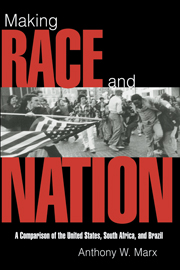Preface and Acknowledgments
Published online by Cambridge University Press: 05 June 2012
Summary
This is not the book I intended to write. I have written previously on the emergence of race, national and class identity, and varying forms of mobilization in South Africa. In doing so, I became intrigued by the parallels with ideology and strategies of protest pursued by African-Americans. There seemed to be odd similarities, given the dramatic differences in context, not least demographic differences. I then became further intrigued by the case of Brazil. Given South African and American experiences, it seemed surprising that comparable racial inequalities in Brazil were not more fully challenged. So I added Brazil to what expected to be a comparative study of racial mobilization.
What then accounts for the divergences? The obvious answer was that South Africa and to a lesser extent the United States had imposed legal segregation, with nothing comparable having been enforced in post-abolition Brazil. If this helped to explain the corresponding difference in levels and forms of identity consolidation and mobilization, then I had to explain why Jim Crow segregation and apartheid developed, and such legal institutions did not in Brazil. A comparative study of black politics forced me into a related study of different forms of white supremacy, which themselves required explanation. And addressing this new concern forced me back in time, for surely such policies were grounded in the legacies of slavery, colonialism, culture, earlier solidarities, and economic development.
- Type
- Chapter
- Information
- Making Race and NationA Comparison of South Africa, the United States, and Brazil, pp. xi - xviiiPublisher: Cambridge University PressPrint publication year: 1997

